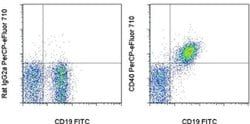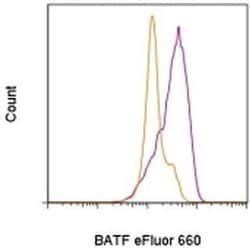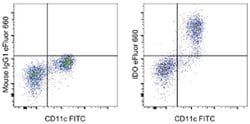CD40 Monoclonal Antibody (1C10), PerCP-eFluor™ 710, eBioscience™, Invitrogen™
Manufacturer: Fischer Scientific
Select a Size
| Pack Size | SKU | Availability | Price |
|---|---|---|---|
| Each of 1 | 50-112-8974-Each-of-1 | In Stock | ₹ 36,490.00 |
50-112-8974 - Each of 1
In Stock
Quantity
1
Base Price: ₹ 36,490.00
GST (18%): ₹ 6,568.20
Total Price: ₹ 43,058.20
Antigen
CD40
Classification
Monoclonal
Concentration
0.2 mg/mL
Formulation
PBS with 0.09% sodium azide; pH 7.2
Gene Accession No.
P27512
Gene Symbols
CD40
Purification Method
Affinity chromatography
Regulatory Status
RUO
Gene ID (Entrez)
21939
Content And Storage
4° C, store in dark, DO NOT FREEZE!
Form
Liquid
Applications
Flow Cytometry
Clone
1C10
Conjugate
PerCP-eFluor 710
Gene
CD40
Gene Alias
AI326936; B cell surface antigen CD40; B cell-associated molecule; B-cell surface antigen CD40; Bp50; CD antigen CD40; Cd40; CD40 antigen; CD40 antigen (TNF receptor superfamily member 5); CD40 antigen, TNF receptor superfamily member 5; CD40 molecule; CD40 molecule, TNF receptor superfamily member 5; CD40L receptor; CDw40; GP39; HIGM1; I79_006806; IGM; IMD3; Immunoglobulin M; ImmunoglobulinM; membrane protein CD40; MGC9013; p50; receptor for ligand CD154; sCD40; soluble CD40; T-BAM; T-cell differentiation antigen; Tnfrsf5; TRAP; tumor necrosis factor receptor superfamily member 5; tumor necrosis factor receptor superfamily, member 5
Host Species
Rat
Quantity
100 μg
Primary or Secondary
Primary
Target Species
Mouse
Product Type
Antibody
Isotype
IgG2a κ
Description
- Description: The 1C10 monoclonal antibody reacts with mouse CD40, a 45-50 kDa type I transmembrane glycoprotein
- CD40 is a member of the TNFR family and is expressed by mouse B lymphocytes, follicular dendritic cells, thymic epithelium, and a subset of peripheral T cells
- CD40 regulates B cell development/maturation by inducing Ig isotype switching and in combination with other signals such as IL-4, protects B cells from surface Ig-induced apoptosis and promotes proliferation
- Interaction of CD40 with CD154 (gp39), its ligand on T cells, is important in T-B cell crosstalk and plays a role in costimulation and immune regulation
- The monoclonal antibody 1C10 is reported to have agonistic activity in vitro and in vivo
- Applications Reported: The 1C10 antibody has been reported for use in flow cytometric analysis
- Applications Tested: This 1C10 antibody has been tested by flow cytometric analysis of mouse splenocytes
- This can be used at less than or equal to 0.5 μg per test
- A test is defined as the amount (μg) of antibody that will stain a cell sample in a final volume of 100 μL
- Cell number should be determined empirically but can range from 10^5 to 10^8 cells/test
- It is recommended that the antibody be carefully titrated for optimal performance in the assay of interest
- PerCP-eFluor™ 710 emits at 710 nm and is excited with the blue laser (488 nm); it can be used in place of PerCP-Cyanine5.5
- The CD40 antigen is a single chain glycoprotein that is known to be a member of the tumor necrosis factor/nerve growth factor superfamily and shows a significant homology to the Hodgkin's disease associated antigen, CD30
- CD40 is present on all B cells except plasma cells and is also found on some epithelial cells, carcinomas and lymphoid dendritic cells
- CD40 has been found to be essential in mediating a broad variety of immune and inflammatory responses including T cell-dependent immunoglobulin class switching, memory B cell development, and germinal center formation
- AT-hook transcription factor AKNA is reported to coordinately regulate the expression of CD40, which may be important for homotypic cell interactions
- Adaptor protein TNFR2 interacts with CD40 and serves as a mediator of the signal transduction
- The interaction of CD40 and its ligand is found to be necessary for amyloid-beta-induced microglial activation, and thus is thought to be an early event in Alzheimer disease pathogenesis
- Two alternatively spliced transcript variants of CD40 encoding distinct isoforms have been reported
- Diseases associated with CD40 dysfunction include Type 3 Hyper-Igm immunodeficiency and CD40 ligand deficiency.



